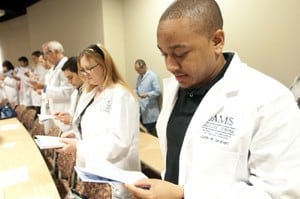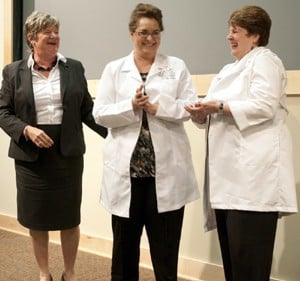Grad Students Don Lab Coats in Research Induction
Oct. 11, 2011 | Following two years of classroom work, 34 graduate students donned while lab coats in a recent ceremony that signified the next step toward earning their doctorate. The UAMS Graduate School Research Induction Ceremony, held Sept. 27, celebrated an important transition for students who had passed their doctoral candidacy exam. The exam follows the first two years of graduate school, which is spent mostly in the classroom. Now the students begin work toward their research-focused doctoral dissertation. “This is truly the defining moment in your lives. At this point all of the angst and sweat of your qualifying exams is behind you and you all know more now than you ever will the rest of your careers. It’s a pivotal point in your lives and that’s why we’re here to celebrate,” said Graduate School Dean Robert E. McGehee, Ph.D. The ceremony also marks a time when the students have selected a mentor or major graduate advisor who assumes the role of mentor from their academic program’s graduate director. The mentor supports and guides the student on his/her academic journey and is usually selected based on the student’s research interest. During the ceremony the students don their coats one by one with help from their advisor and their program director. “I encourage you all to celebrate this accomplishment, especially as life throws us many curve balls along the way,” said Helen Beneš, Ph.D., professor of neurobiology and developmental sciences and associate director of the bioinformatics graduate program, who read the names of each student. The students pursuing the Doctor of Philosophy degree all have successfully passed the Ph.D. qualifying exam and are now formal Ph.D. candidates. Afterward, the candidates recited an Affirmation of Scientists, pledging to “ensure that the results of my research and other scientific activities ultimately benefit humanity” and to “become a worthy role model deserving of respect by those who follow me.” The doctoral candidates represented 11 programs: biochemistry and molecular biology, bioinformatics, cellular physiology and molecular biophysics, communication sciences and disorders, health systems research, interdisciplinary biomedical sciences, interdisciplinary toxicology, microbiology and immunology, neurobiology and developmental sciences, nursing science, and pharmacology. Upon passing the candidacy exam, doctoral candidates have seven years to complete their dissertation, a document submitted in support of their doctoral candidacy that usually details the findings of a research project in their chosen discipline. |

